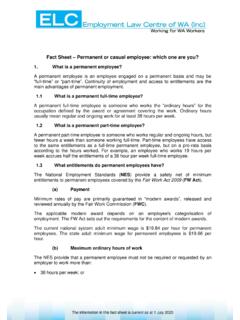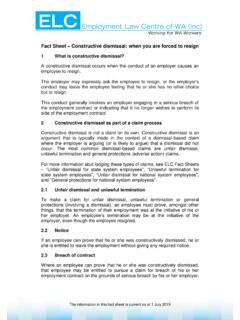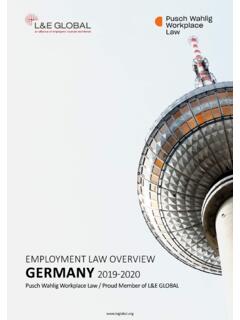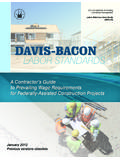Transcription of Restraint of Trade - Employment Law Centre of WA
1 Fact Sheet Restraints of Trade : can your employer restrict what you do during and after Employment ? 1. What is Restraint of Trade ? Restraint of Trade occurs when an employer attempts to prevent an employee from carrying out certain activities that are related to his or her Employment . It is not uncommon for Employment contracts to include Restraint of Trade clauses . that may apply both during the Employment and after the Employment comes to an end. Even when there is no Restraint set out in an Employment contract , the law implies certain restraints into every Employment relationship.
2 Some of these implied restraints may continue after the Employment comes to an end. This fact sheet briefly outlines the various sources of restraints against an employee. It also provides some guidance about the scope of those restraints. The idea is to present a broad overview of when a Restraint may apply and in what circumstances a court will enforce it. However, please note that the specific circumstances of your Employment will determine whether a Restraint of Trade is enforceable or not. If you are facing a Restraint of Trade dispute, you should seek independent legal advice.
3 2. Sources of restraints There are four main sources of restraints against past or present employees. They are: restraints set out in an Employment contract ( Restraint of Trade clauses );. the implied duty of fidelity and good faith;. the equitable duty of confidence; and fiduciary duties. Under each of these sources, a number of specific restrictions or duties may be found. Note that there is some overlap between the restrictions and duties that may apply under each of these sources. 3. Enforcement of restraints of Trade The law prohibits unreasonable restraints on grounds of public policy.
4 It is in the public interest for people to be reasonably free to pursue any lawful Trade or Employment they want. On this basis, the starting point with restraints of Trade is that they are void, unless the Restraint can be justified as reasonable in the circumstances. A Restraint will be reasonable if it affords no more than adequate The information in this fact sheet is current as at 1 July 2019. protection to the employer's business, while at the same time not being injurious to the public. Post- Employment restraints ( restraints imposed on employees after the Employment relationship has ended) are generally more open to legal challenge than restraints imposed during Employment .
5 Factors which indicate whether a post- Employment Restraint is reasonable may include time, geographical area and the specific activities or information restrained. Where a Restraint is for a long period of time, a broad geographical area or covers a broad range of activities, it is less likely to be enforceable. With respect to confidentiality, it can be difficult to protect information that is neither personal information nor a Trade secret . Where restraints of Trade are valid, breaches (or threatened breaches) by an employee could result in an injunction preventing the breach, an order for compensation to the employer or recovery of profits resulting from the breach.
6 4. Express contractual restraints ( Restraint of Trade clauses ). Employment contracts sometimes contain clauses that expressly prohibit the employee from engaging in certain activities. The effect of these clauses will depend on how they are worded. Where such clauses exist, they generally apply during the course of Employment . Sometimes, they may attempt to continue applying after the Employment comes to an end. The most common Restraint of Trade clauses are: no competition clauses ;. non-solicitation clauses .
7 No poaching / recruitment clauses ; and confidentiality clauses . Each of these types of Restraint of Trade clause is discussed below. If an employer wrongfully dismisses an employee, the employer loses the benefit of an express Restraint of Trade clause. The employee can disregard the post- Employment Restraint . The exception to this is for confidentiality clauses protecting a Trade secret . In such cases, even though the contractual clause may be unenforceable, the equitable duty of confidence will still require the employee to maintain confidentiality (see [6] below).
8 No competition clauses No competition clauses prevent an employee (or former employee) from competing with the employer. A clause of this type which applies during the period of Employment will be valid where it is reasonably necessary and adapted to protect the employer's business interests. The Employment Law Centre of WA (Inc) Page 2 of 8. As discussed above, factors which indicate whether a post- Employment Restraint is reasonable or not may include time, geographical area and the specific activities restrained.
9 Non-solicitation clauses Non-solicitation clauses prohibit a former employee from seeking out and trying to take (or solicit ) the employer's clients. In determining whether solicitation . has occurred, who makes the initial contact is not decisive. In other words, it may still be solicitation where the client makes the first contact. There is no blanket prohibition against accepting work from a former client. The line is crossed into solicitation when a former employee, in response to an approach by a client, goes beyond merely showing a willingness to be engaged and positively encourages the client to engage him or her.
10 Again, an unreasonably wide clause is unlikely to be enforceable. No poaching / recruitment clauses No poaching / recruitment clauses prohibit a former employee from persuading other employees to leave their existing Employment and work for him or her. Again, such restraints are usually limited by time, area and activities, with broader restraints being harder to enforce. Confidentiality clauses Confidentiality clauses protect the employer's Trade secrets and other confidential information. Confidentiality clauses generally remain in force whilst the information protected remains confidential.








